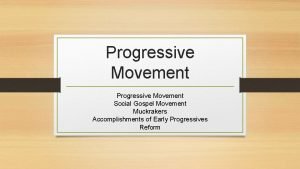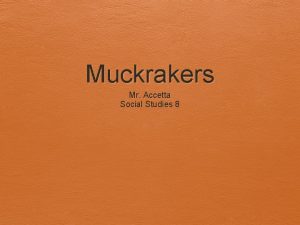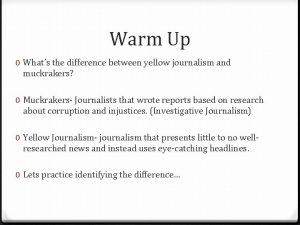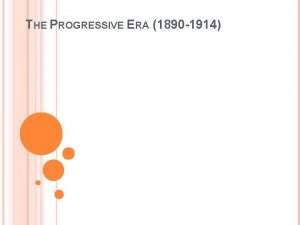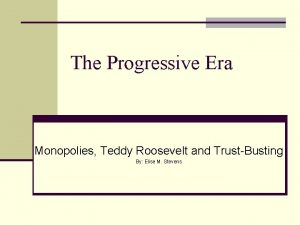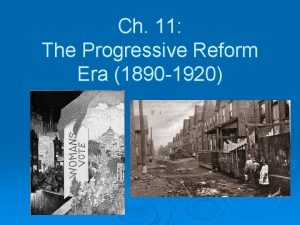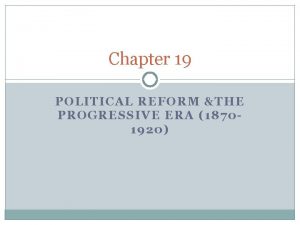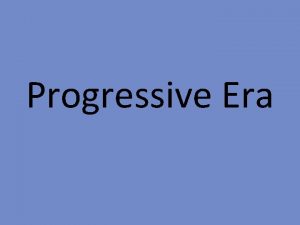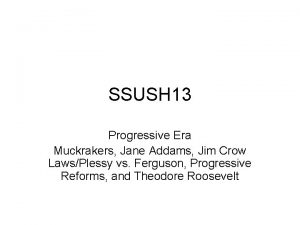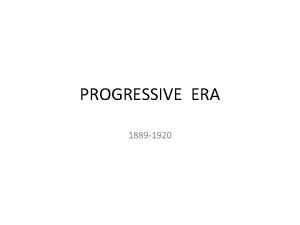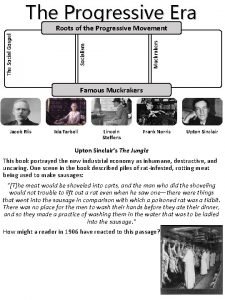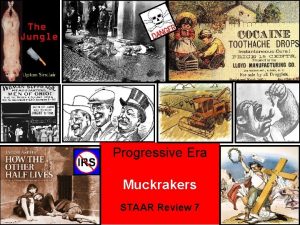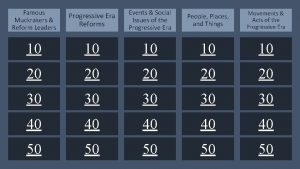The Muckrakers Who Progressive era journalistsauthors What Wrote












- Slides: 12

The Muckrakers

Who: Progressive era journalists/authors What: Wrote about and exposed the corruption or evils of society in the progressive era. When: Progressive era (1880 -1920) Significance: The writings led to reforms or changes in housing, industry, government, labor, women’s rights and the economy.

History of Muckrakers Muckraker: "A man that could look no way but downward" –Theodore Roosevelt, 1906. Theodore Roosevelt first coined the term, "muckraker. " It had a negative connotation and was intended to be a smear - one shouldn't concentrate on the "muck" of society. (The quote: "the man who could look no way but downward" was part of the description Roosevelt offered in 1906). The muckrakers, however, used the term positively and as a badge of honor and investigative journalism was borne.

Key Muckraker’s • • • Ida Tarbell Upton Sinclair Helen Hunt Jackson Jacob Riis Lincoln Steffens

Ida Tarbell “Imagination is the only key to the future. Without it none exists— with it all things are possible. ” • Ida Tarbell was a Mc. Clure’s magazine journalist and investigative reporting pioneer. Tarbell exposed unfair practices of the Standard Oil Company, leading to a U. S. Supreme Court decision to break its monopoly. She was familiar with the oil business; her father had been an oilman and ran out of business because of Standard Oil. Tarbell dug into the Rockefellers' family oil monopoly and uncovered their unfair business practices. Her discoveries were first published in Mc. Clure’s magazine and later published as the book The History of the Standard Oil Company (1904).

Upton Sinclair • Upton Sinclair is best known for his book The Jungle. The intent of the novel was to portray the lives of immigrants in the United States. However, readers were more concerned with his explanation of bad practices and corruption of the American meatpacking industry during the early 20 th century. The novel depicts, in harsh tones, poverty, the absence of social programs, unpleasant living and working conditions, and the hopelessness prevalent among the working class. The book influenced Congress to create the Meat Inspection and Pure Food and Drug Act.


The Jungle Excerpt • There was never the least attention paid to what was cut up for sausage; there would come all the way back from Europe old sausage that had been rejected, and that was moldy and white—it would be dosed with borax and glycerine and dumped into the hoppers and made over again for home consumption. There would be meat that had tumbled out on the floor, in the dirt and sawdust, where the workers had tramped and spit uncounted billions of consumption germs. There would be meat stored in great piles in rooms; and the water from leaky roofs would drip over it, and thousands of rats would race about on it. It was too dark in these storage places to see well, but a man could run his hand over these piles of meat and sweep off handfuls of the dried dung of rats. These rats were nuisances, and the packers would put poisoned bread out for them, they would die, and then rats, bread, and meat would go into the hoppers together. The meat would be shoveled into carts, and the man who shoveled would not trouble to lift out a poisoned rat even when he saw one—there were things that went into the sausage in comparison with which a poisoned rat was a tidbit. There was no place for the men to wash their hands before they ate their dinner, and so they made a practice of washing them in the water that was to be ladled into the sausage. There were the butt-ends of smoked meat, and the scraps of corned beef, and all the odds and ends of the waste of the plants, that would be dumped into old barrels in the cellar and left there. Under the system of rigid economy which the packers enforced, there were some jobs that it only paid to do once in a long time, and among these was the cleaning out of the waste barrels. Every spring they did it; and in the barrels would be dirt and rust and old nails and stale water—and cart load after cart load of it would be taken up and dumped into the hoppers with fresh meat, and sent out to the public's breakfast. Some of it they would make into "smoked" sausage—but as the smoking took time, and was therefore expensive, they would call upon their chemistry department, and preserve it with borax and color it with gelatine to make it brown. All of their sausage came out of the same bowl, but when they came to wrap it they would stamp some of it "special, " and for this they would charge two cents more a pound. . ENJOY YOUR JIMMY DEAN!!!

Helen Hunt Jackson • Helen Hunt Jackson was a United States writer who became an activist on behalf of improved treatment of Native Americans by the U. S. government. She detailed the adverse effects of government actions in A Century of Dishonor (1881). Her novel Ramona dramatized the federal government's mistreatment of Native Americans in Southern California and attracted considerable attention to her cause, [ • A Century of Dishonor Summary

Jacob Riis • How the Other Half Lives was an early publication of photojournalism by Jacob Riis, that documented the awful living conditions in New York slums in the 1880 s. It was early muckraking" journalism by exposing the slums to New York City’s upper and middle classes. • The book describes how the system of tenement housing had failed, as he claims, due to greed and neglect from wealthier people. He claims a correlation between the high crime rate, drunkenness and reckless behavior of the poor and their lack of proper living conditions. Chapter by chapter he uses his words and photographs to expose the conditions inhabited by the poor in a manner that “spoke directly to people's hearts”.

Lincoln Steffens • The Shame of the Cities was a work published in 1904 by Lincoln Steffens that sought to expose public corruption in many major city governments throughout the U. S. The work consists of articles written for Mc. Clure's magazine in one collection. His goal was to provoke public outcry and thus promote reform. It showed the suffering and hardships of those who immigrated to America. • It is considered one of the first primary examples of muckraking journalism, which sought to expose problems in society in the Progressive Era.

Quick Check * ___ Ida Tarbell 1. ___ Shame of the Cities *___ Upton Sinclair 2. ___ A Century of Dishonor *___ Jacob Riis 3. ___ The Jungle *___ Helen Hunt Jackson 4. ___ How the Other Half Lives *___ Lincoln Steffens 5. ___ History of Standard Oil A. Collection of magazine articles that showed the corruption of city government across the U. S. B. Exposed the evils of the meatpacking industry in the U. S. C. Photojournalism publication that explains the tenement living conditions in the cities. D. Book which told how the Oil industry was corrupt and forced small companies out of business E. Book which told of the hardships faced by Native-Americans at the hands of the federal government.
 Muckrakers accomplishments
Muckrakers accomplishments Muckrakers webquest
Muckrakers webquest Whats yellow journalism
Whats yellow journalism Simple past and past progressive exercises
Simple past and past progressive exercises Past perfect continuous function
Past perfect continuous function Present passive
Present passive What does glinda the good witch represent in populism
What does glinda the good witch represent in populism Promoting moral improvement
Promoting moral improvement Trust busting progressive era
Trust busting progressive era Chapter 11 the progressive reform era
Chapter 11 the progressive reform era Chapter 19 political reform and the progressive era
Chapter 19 political reform and the progressive era Biology staar kahoot
Biology staar kahoot John dewey progressive era
John dewey progressive era
